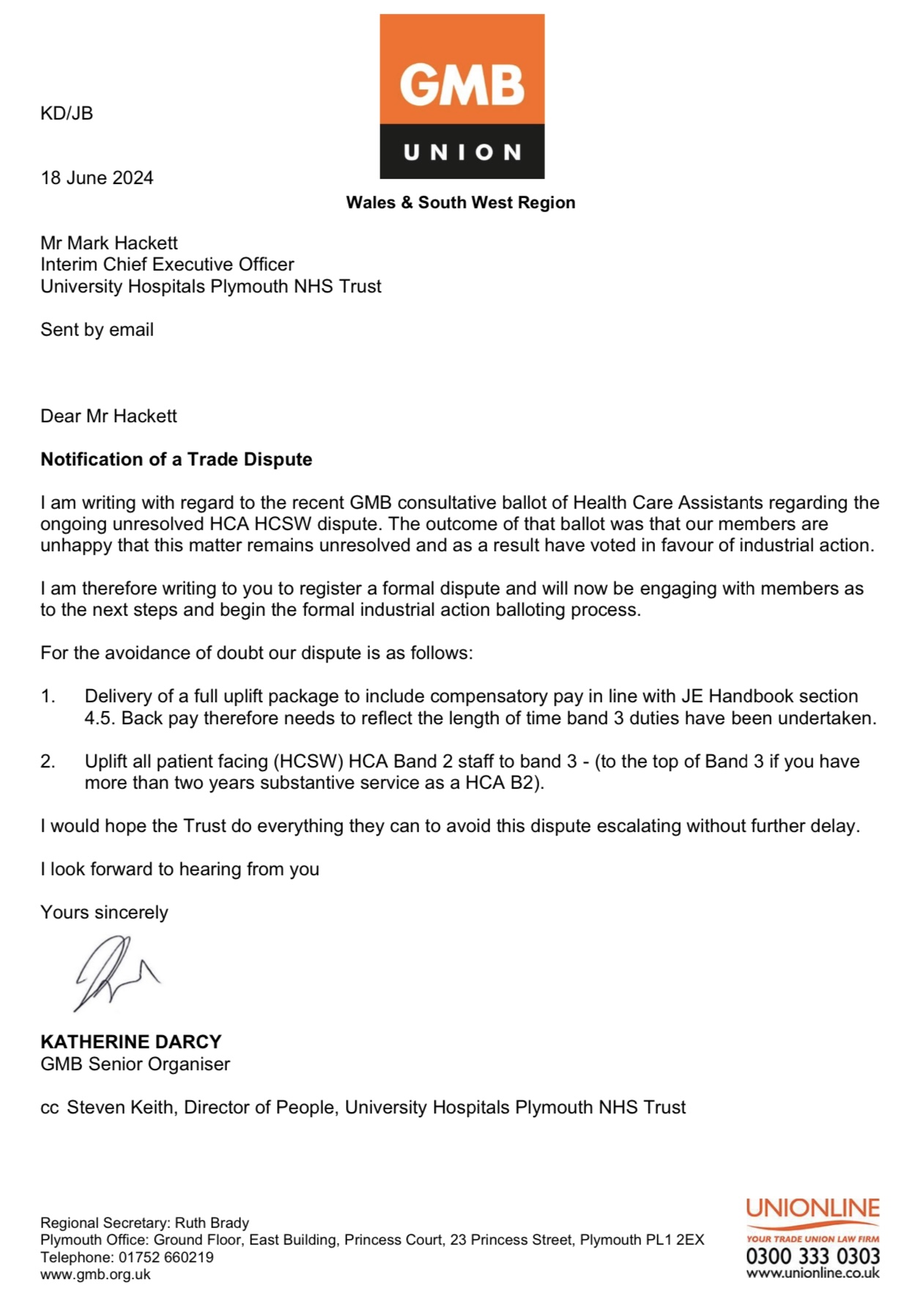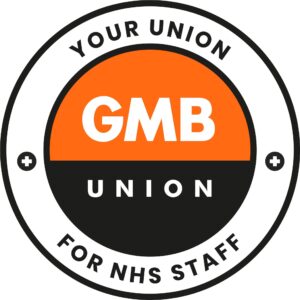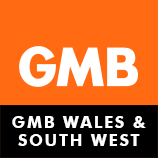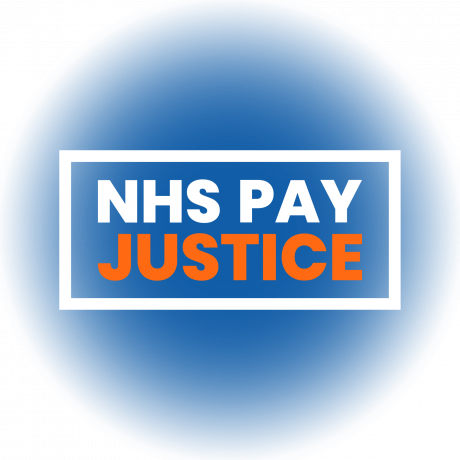Health Care Support Workers, Dispute Update

_________________
Update 26th July 2024
Wednesday 24th July three online sessions were offered to our HCSW members. We have decided that we will offer some more sessions. An invitation will be sent to all members for another two timed sessions on Wednesday 31st July at 9am – 9.30am & 5pm – 5.30pm. If you would like to join a session click the link in the email or via the SMS text message or Form page. If you have an IT issue, do not have the equipment or struggle with computers please let us know and we can make other arrangements for you to be updated.
The online sessions will be led by Katherine Darcy, GMB Senior Regional Officer & Ray Stewart, GMB Health Branch Secretary.
We do understand the frustration of waiting for detail and further actions however, behind the scenes there are discussions taking place and with an ever changing situation and the waiting is a frustration we have to manage.
On Tuesday 16th July ACAS were asked to facilitate collective conciliation between the Joint Trade Unions (GMB, Unite, RCN & Unison) and the Employer, (UHP). ACAS collective conciliators are independent and impartial. This means they do not take sides or impose solutions. They’re there to help both parties find a solution that everyone agrees to. ACAS conciliator has contacted the GMB Union and this process will commence soon and hopefully we will have some more substantial and up to date information for you.
As of 26th July there have been introductions between the ACAS and the Trade Unions but there are currently no meetings planned.
_________________
*To enable the GMB to communicate with you quickly and to ensure that you receive all relevant information and ballot documents, Please ensure that your personal, work and contact details are up to date. Consider authorising the use of Text message (SMS), email in the membership options. Change contact options via your GMB Website login page via GMB Union website , GMB Plymouth 01752 660219, Regional office. 02920 491 260, Derriford Health Branch office, 01752 439274 (ext 39274).
Please complete a short survey to update your workplace details HERE

Following is information about how any industrial action ballots are regulated and how the process would work in the NHS, Health Care Services.
Trade Union Act 2016.
** Ballot thresholds ‘Turnout threshold’.
For industrial action to go ahead, the Trade Union Act requires 50 per cent of those entitled to vote to turn out and a majority to vote in favour. This means that if 1,000 members are balloted, at least 500 must turn out and at least 251 must vote ‘yes’ before any industrial action – including strikes and action short of a strike – can go ahead. ‘Support threshold’. As well as meeting the 50 per cent threshold.
In ‘important public services’ (Health) 40% of those entitled to vote must support industrial action for it to go ahead. This means that if 1,000 members are balloted, at least 500 members must vote and 400 (80%) would have to vote ‘yes’ for industrial action for it to take place.
The government introduced regulations that list which jobs in the six sectors (see box) are treated as ‘important public services’ and are therefore covered by the additional 40 per cent threshold. The 40 per cent threshold only applies to a ballot if the majority of members entitled to vote are normally engaged in delivering an ‘important public service’. Industrial action rules. The TU Act also introduces strict new rules on industrial action ballots and notices. As well as complying with existing legal conditions for industrial action, unions must: Include extra information on voting papers which summarises the dispute, lists the types of action short of a strike – IMPORTANT PUBLIC SERVICES. The TU Act says ‘important public services’ can fall within six sectors: health, education of those aged 5 to16 , fire services, transport, nuclear decommissioning and management of radioactive waste and spent fuel*, and border security.
Provide 14 days’ notice of industrial action (double the previous requirement). This can be reduced to 7 days where the employer agrees.
Re-ballot members after 6 months if industrial action is to continue (or 9 months if the employer agrees).
Report extra information about ballot results to members and employers. Report annually to the CO on any industrial action taken.
Strike Action
TUC – Minimum Service Levels during Strikes
Understand the law!

Trade Unions demanded the following as part of the formal dispute with UHPT. (October 2023).
- Uplift all patient facing (HCSW) HCA Band 2 staff to band 3 – (To the top of Band 3 if you have more than two years substantive service as an HCA B2).
- Back-pay needs to be considered alongside the uplift as a whole ‘package’. The job evaluation handbook states “4.5 If the banding outcome changes as a result of re-evaluation, that change should be backdated to when the postholder and manager agreed the job has changed.”
Back-pay should reflect the length of time that band 3 duties have been undertaken. Note that Aug 2021 was when the NHS job evaluation group issued guidance for clarification on the distinctions between band 2 and 3. The distinctions existed prior to this date, so back-pay should be applied on service carried out at band 3 before August 2021 as well, where applicable. Trade Unions have agreed to demand back pay from 2019 to the uplift date.
University Hospitals Plymouth NHS Trust (UHPT) employs over 900 (Band 2 and band 3) Health Care Support Workers / Health Care Assistants, Imaging Care Assistants, Maternity Care Workers (All HCA by another name) at Derriford Hospital and Mount Gould Hospital (Wards), on wards and in departments, delivering vital front line health care to patients.
The role of and HCA has evolved considerably over the years and this has happened without any recognition or fair pay; leaving HCAs feeling undervalued in their role, with over 80% of UHPT HCAs carrying out duties deserving of a higher pay grade (Band 3). Over 400 HCAs employed by UHPT should have been receiving Band 3 pay many years ago.
What type of activities are defined as personal care?
Personal care broadly means daily activities of living. This can include toileting, bathing, dressing, feeding and assisting patients with their appearance including for example brushing hair.
What does recording patient information mean?
Recording patient information means activities such as fluid balance (intake and output), nutrition – eating meals and making notes of these on a patient information system. It also includes personally generated clinical observations, test results and patient care activities for example, changing a wound dressing, taking blood pressure.
What type of activities are defined as patient observations?
HCAs operate across a wide spectrum of healthcare environments in hospitals, community settings, mental health facilities, maternity services and clinics. Patient observations will therefore vary depending on the setting and activities carried out. These can include the following:
Taking blood pressure, blood glucose levels, pregnancy testing, routine maternal and neonatal observations, observing patients for signs of agitation or distress (mental health).
What are clinical care duties and clinical observations?
These include venepuncture, removal of catheters, removal of peripheral cannula, wound observation and dressings, urinalysis, pregnancy testing, infant feeding support, one-to-one observations in mental health settings and programmes of care, therapy or treatment determined by others.
HCA Band 2 would undertake personal care such as feeding, bathing, toileting, recording fluids balance and nutrition.
HCA Band 3 would undertake Monitoring of heart rate and blood pressure, bloods, wound observations during analysis.
There will be very few HCA’s employed by UHP who have not undertaken the Care Certificate or additional clinical observations/skills training over the past four years. This should be evidenced either digitally on ESR or as a paper copy in their personal file held by their department/ward manager.
- These are not just blood pressure, pulse and temperature but must include skills such as venepuncture, visual acuity, neurological observations, blood glucose monitoring, pregnancy testing, routine maternal and neonatal observations, observing patients for signs of agitation or distress, wound observations and simple wound dressings, removal of peripheral cannula, urinalysis, removal of catheter.
- Guidance was provided to UHPT by NHS Employers in August 2021 – Almost 3 years ago! clarifying the review and the key differences between an HCA Band 2 and the HCA Band 3 job profiles. This guidance lists different initiatives and programmes of work that have impacted on the roles of the HCSW CSW-employer-guidance.pdf (nhsemployers.org)
- UHP have indicated that they are not currently prepared to uplift longer serving HCA Band 2 employees to the top of Band 3. There are over 400 HCA Band 2 employees who have been identified as having over 2 years service as an HCA. GMB feels that those members deserve to be uplifted to the top of Band 3.
- NHS Staff Council agreed some helpful guidance on the interaction between promotion and unsocial hours Pay on Promotion Scenarios & FAQs | NHS Employers Section 1.18.
If you have any questions please contact;
katherine.darcy@gmb.org.uk or raymond.stewart@gmbactivist.org.uk


